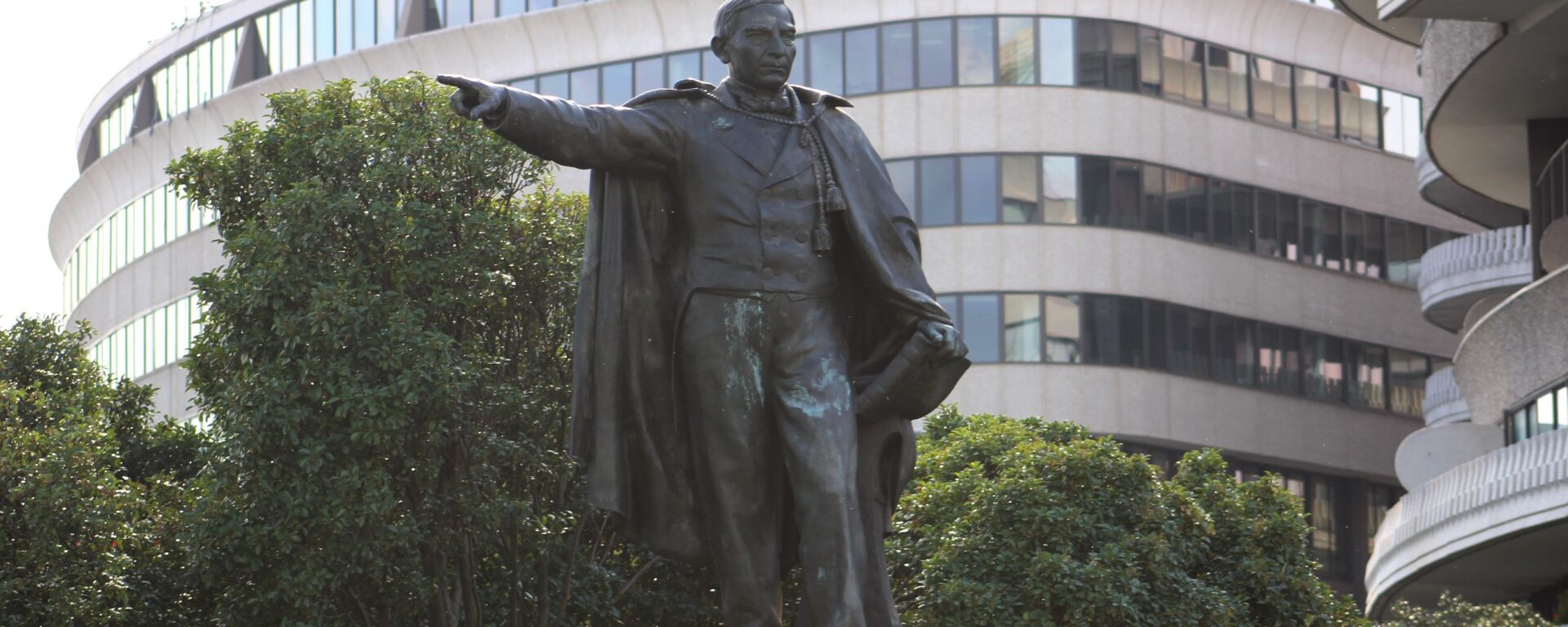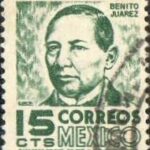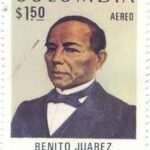“Among individuals, as among nations, respect for the rights of others is peace.”
Standing in front of the Watergate Hotel and the Royal Embassy of Saudi Arabia is the statue of one of the most prominent leaders in Mexican history – Benito Juárez. Facing north, with a stand of trees behind it, the visage of the statue is often shaded and overlooked. Add to that its distance from the National Mall and it’s easy to understand why few know of its existence.
Dedicated in 1969 in a ceremony attended by U.S. Secretary of State Dean Rusk and Mexican Foreign Minister Antonio Carrillo Flores, the statue was a gift from Mexico in exchange for a statue of Abraham Lincoln that the U.S. had given to the Mexican government in 1966.

Originally cast in 1891, the statue in D.C. is a copy of one that stands in Oaxaca, Mexico, the home state of Juárez. The sculptor was Enrique Alciati, who is most well-known for his Angel of Independence statue atop the Independence Column in Mexico City. Alciati’s Juárez stands atop an 11-foot base. Its right arm points to the east; its left hand rests on a book titled “Reforma” that rests on a pedestal – a reference to the sweeping reforms he would initiate in Mexico.
Juárez was a Zapotec Native American born to illiterate parents who died when he was 3. He didn’t learn Spanish until he was 12 years old but became a lawyer before the age of 30 and a judge before 40. In 1847 – at age 41 – he became the governor of Oaxaca and served for five years. He was forced to leave the country due to his opposition to the dictator Antonio López de Santa Anna and spent a two-year exile in New Orleans.

Santa Anna resigned and Juárez returned in 1855. The Liberal Party, of which Juárez was a member, formed a provisional government that would mark the beginning of the period known as La Reforma. It was during this time, when Juárez was the Minister of Justice for the new government, that the Juárez Law was passed. This law formally and finally separated the powers of church and state in Mexico, which before had been dominated by the Catholic Church.
The reforms taking place in the country – the Juárez Law, freedom of speech, freedom of religion, right to bear arms – culminated in the Constitution of 1857. The conservatives in Mexico, backed by the military and the church, revolted against the new government in what would be called the Reform War. The liberal president had resigned at the demand of the conservatives, and Juárez – according to the Constitution of 1857 – was next in line for the presidency. While the conservatives were in control of Mexico City, Juárez and the liberals resisted the coup from the port city of Veracruz until their victory in January 1861.
The victory was short-lived, however. Juárez suspended foreign debt payments for two years to help rebuild the shattered infrastructure and economy. By December 1861, France, angered over the unpaid debts, invaded Mexico. The Juárez government again fled Mexico City and in 1864 the French installed Maximilian – brother of Austrian Emperor Francis Joseph I – as Emperor of Mexico. Maximilian offered Juárez the position of Prime Minister but Juárez wouldn’t accept the legitimacy of a monarch or a government imposed by a foreign nation.
The U.S. became involved after the end of the Civil War. Maximilian had invited Confederates to Mexico to support his cause, and the U.S. – due to the Monroe Doctrine – couldn’t allow a European government to interfere with politics in the western hemisphere. The U.S. demanded the French leave. Fearing a war with the U.S. and facing increasing threats in Europe, the French left in 1866 but Maximilian refused to go with them. Juárez’s forces captured Maximilian in 1867, and despite pleas from the United States and the monarchies of Europe, he was executed. This was in part due to his “Black Decree,” which ordered all of Juárez’s followers executed, and in part as a message that Mexico would not tolerate the intervention of a foreign government.

Juárez served as president until his death in 1872. Airports, towns, roads, and even a mountain range in Mexico bear his name. He is remembered for his progressive policies and his dedication to equality and justice. He occupied the attention of European powers during the Civil War and thus is credited with keeping the Confederacy isolated and contributing to a Union victory. He was even elected to the Military Order of the Loyal Legion of the United States (a Civil War veterans’ organization) in his lifetime. Few foreign leaders are more deserving of a statue in Washington, D.C.

Resources used for this article:
https://en.wikipedia.org/wiki/Benito_Ju%C3%A1rez
https://en.wikipedia.org/wiki/Enrique_Alciati
http://www.infoplease.com/encyclopedia/people/juarez-benito.html
http://archives.chicagotribune.com/1969/01/04/page/19/article/mexico-presents-gift-to-u-s


